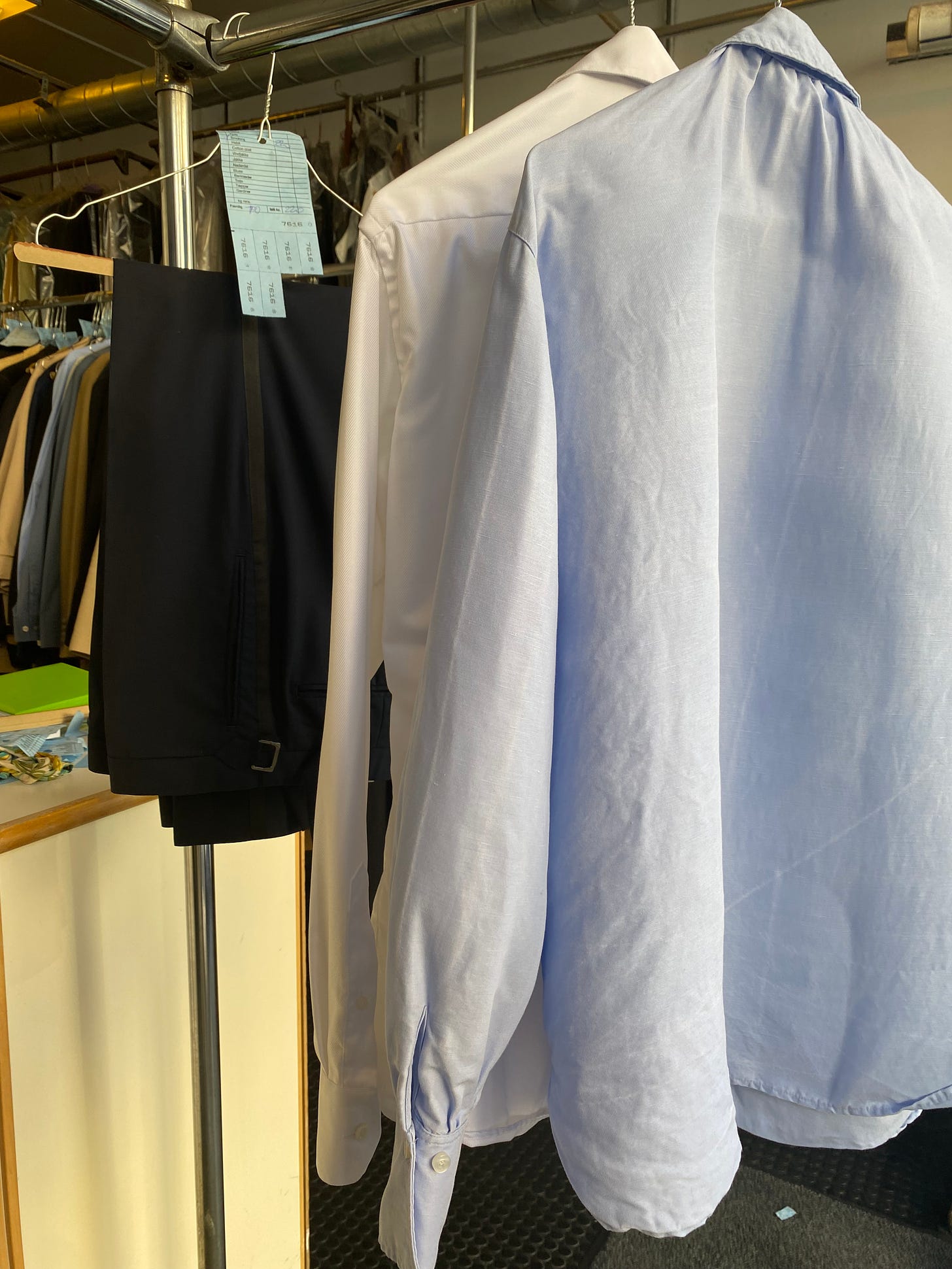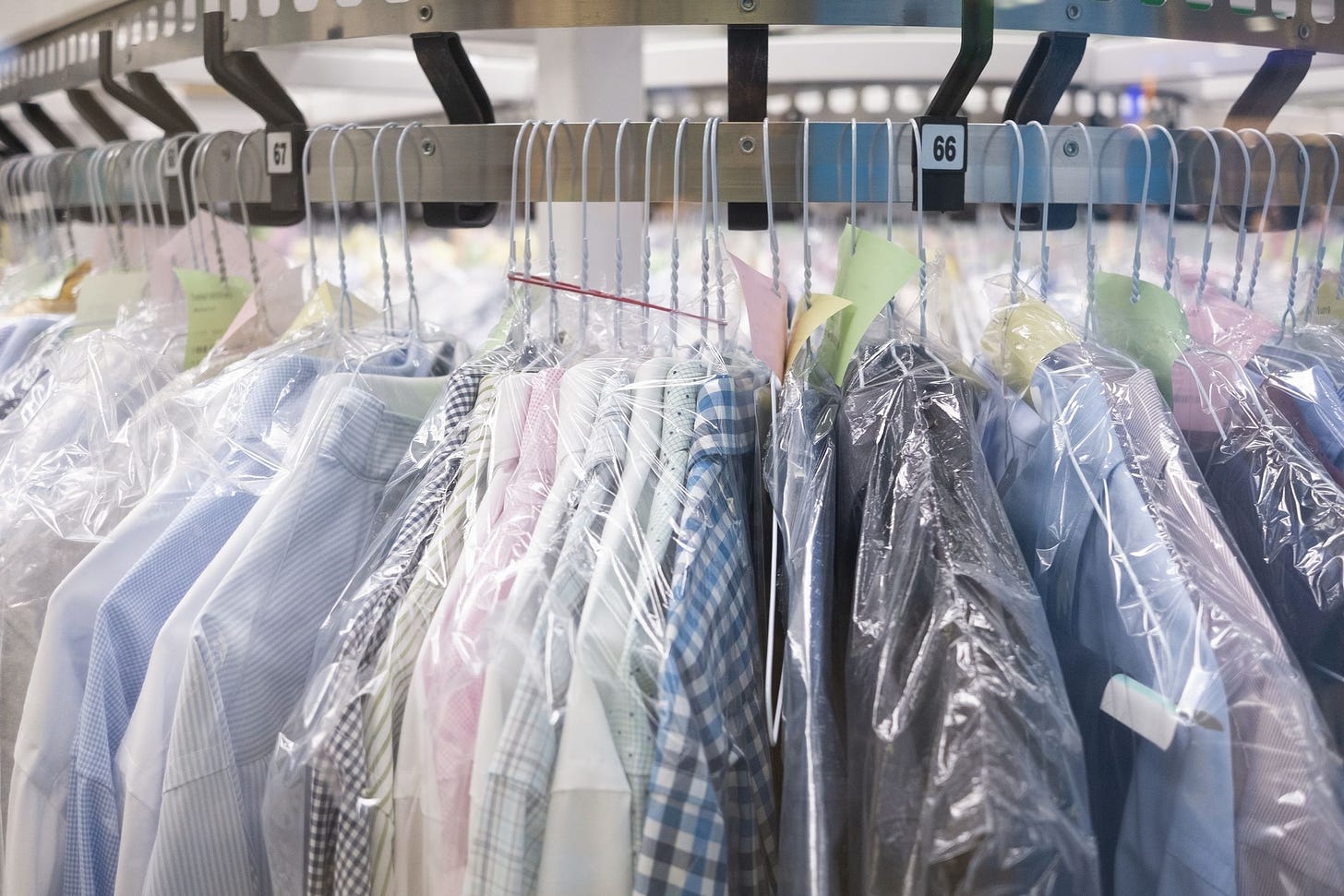I know this may seem like a radical notion to some, but dry cleaning is terrible for our clothes. And not to mention, the environment. A lot of brands put “dry clean only” on their care labels as suggestions, in case you wash it incorrectly as it usually is a more delicate piece. BUT you don’t actually need to dry clean it!
Back in my 20s, I spent a small fortune on dry cleaning. Sometimes, I would wait until I had like 8 pieces to dry clean, then suddenly had a $130 dry cleaning bill. Ouch, that hurt…. just to clean my clothes. I’m sure many of you know that feeling.
I started questioning whether I should actually be dry cleaning my clothes after I picked up this beautiful black 100% wool coat I’ve had since I was 18, and I noticed there were small patches of suddenly thinned out fibers/fabric. Only after maybe 3 total dry cleans of it. I was horrified, this expensive beautiful wool coat was starting to “wear out” not because of me actually wearing it, but the dry cleaners. I have never taken it back to a dry cleaner since.
There were also white shirts I would pick up that still had the sweat stain (yes, I’m human and sweat sometimes). Not only that, the dry cleaner made it more difficult for me to get it out myself at home. Or many other types of stains.

It wasn’t until I was rewatching the heartwarming movie a few years ago, “A Good Year,” and saw the cleaning lady washing Russell Crowe’s suit by hand that (after being first surprised) I realized we can wash all of our clothes by hand, using water. After all, if they are natural materials, they have existed in nature being rained on or what have you for thousands of years. There is no need to spend so much on something that is hurting, rather than helping our clothes stay in good condition. So I stopped getting anything dry cleaned (except a few things after the Paris bed bug scare).
Why is dry cleaning so bad, though?
The dry cleaning process is FULL of chemicals, and in particular, solvents of tetrachloroethylene/ perchloroethylene (sounds scary, right?). Those chemicals are “probable” carcinogens by the US’s CDC and UK’s NIH (yes, can cause cancer, there have been particular links to cervical and esophageal cancers).
They can also harm our respiratory system, cause vision problems, and potentially cause liver damage.
Those chemicals stay on our clothes after dry cleaning, so they could be leeching into our bodies. According to a Georgetown study, silk was the only fabric that they found didn’t have high levels of the chemical’s residue left behind (the others tested were cotton, wool, and polyester, which all had high levels left behind). It’s so bad that California has banned dry cleaners from installing new machines with it.
There are some other “safer” chemicals used, but that being less harmful, not exactly safe. One is Hydrocarbon, or DF 2000, which is made from oil, not only harmful to use but highly polluting. Again, why all the oil in our clothes!?
Here’s some helpful, but technical, information, about all the different types of chemicals used in dry cleaning.
From an environmental perspective, dry cleaners pollute these toxins into our air, polluting the air we breathe. Hopefully, most are making sure their filters are stopping that pollution.
What about “organic,” “green,” or “eco” dry cleaners?
If you absolutely can’t bear not dry cleaning some of those special pieces, then OK, go for a “green” dry cleaner. But I would recommend asking those dry cleaners before you go which solvent they use. Not many of these are actually “organic,” in other words, not using chemicals in some way. The better solvent the good “green” cleaners use is Liquid Carbon Dioxide (CO2), which is considered non-toxic. There are also some “wet” processes that do not use chemicals and essentially use detergent and water, but then why even pay for them to do it when you can do it yourself?
How can I clean it instead?
Clean at home: You CAN clean it at home by hand or on delicate load with delicate laundry detergents. I also will often use white vinegar (not white wine or any other that you use on your salads) to help get out stains and neutralize odors.
Stains: it’s better to get them out as soon as it happened anyway, so it doesn’t set. It depends on what caused the stain (food, wine, dirt, etc.), but with food and wine, I’ve had great success with dish detergent (yes, the one used to clean your dishes).
Backing soda on white grease stains as soon as it happens can also work!
Sweaters: Wool and cashmere (that is without any polyblends especially) do NOT need to be dry cleaned, or for that matter cleaned at all. Both fabrics, especially wool, are naturally antibacterial and odor resistant. It is best for those fabrics to lay them out on a chair overnight and let them breathe after wearing them. Stains can get out by rubbing them gently with mild soap or wool soap. Never hang your sweaters, as they will loose their shape and stretch out at the shoulders.






Great post! I know as a designer that the dry clean only label is the default label manufacturers use to protect themselves. I just saw a 100% linen piece with a dry clean only label which is absurd, linen loves to be washed just don't put it in the dyer, in fact most things should air dry. Cashmere as well comes out beautifully hand washed, cold and dried flat. Thanks for the valuable info!!!
In addition to handwashing, you can use a little steamer after. I never take my clothes to the dry cleaners. It’s spendy and patience gets stains out (most of them).